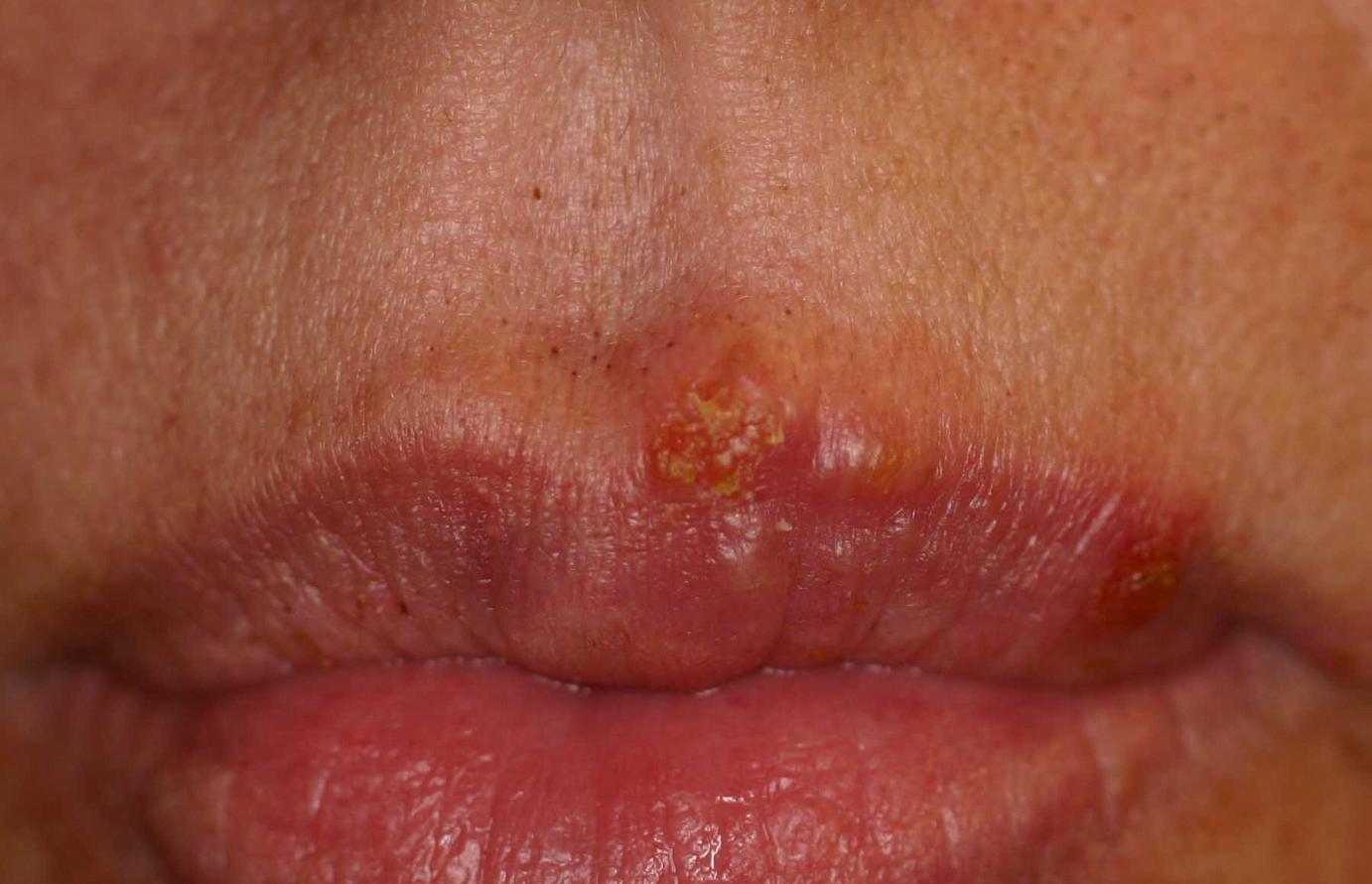Herpes - Patients ask, Dr. Ringpfeil answers
Please feel free to use the blog below to share information about Herpes or to ask Dr. Franziska Ringpfeil a question that might be of interest to others.
Synonyms: cold sores, fever blisters, herpes simplex
Herpes simplex, a common viral disease, is caused by two strains of the herpes simplex virus (HSV). The strains are referred to as herpes simplex virus-1 (HSV1) and herpes simplex virus-2 (HSV2). HSV can infect all areas of the body but most commonly the cavity of the mouth and the genital area. HSV1 causes most breakouts around the mouth and HSV2 causes the majority of genital or buttock lesions. The signs and symptoms of HSV differ between oral and genital infections.

The initial infection (primary stage) of oral herpes is generally asymptomatic and is acquired through person-to-person contact such as kissing. The virus then lies dormant in a nerve root. Reactivation of the virus may be caused by a number of events such as a fever, intense sunlight, intense cold, or stress.
In the active (secondary) stage, individuals with oral herpes have "cold sores" around the mouth or on the face that may become painful ulcers. The early period immediately before the outbreak is referred to as the prodromal period and from this time to the end of the outbreak, the virus can be transmitted to another person by direct contact.
The stages of genital herpes are very similar to oral herpes with an initial stage that manifests with few symptoms and is less contagious. The secondary stage, which can occur unpredictably but is usually mediated by stress or sickness, shows lesions on the vulva or penis.
The lesions are often painful and itchy may also be accompanied by difficulty urinating, lymph node enlargement with tenderness, and puss-like discharge. The herpes virus is most contagious during the active periods but can spread immediately before the outbreak occurs.
For both genital and oral herpes, the dormancy period involves the virus "resting" within the nervous tissue around the initially infected area.
Herpes is commonly diagnosed based upon the symptoms described above paired with frequent recurrence in the same area. Rapid tests have been developed to detect antibodies to the herpes virus. Positive results reveal that you have been exposed to HSV1 or HSV2 in the past.
However, 90% of inner-city populations carry HSV1 antibodies and about 35% carry HSV2. The presence of antibodies does not diagnose a current outbreak. In some instances, samples of representative lesions are taken and tested for the presence of the HSV1 or HSV2 virus.
Once diagnosed with herpes, managing the disease includes caring for sores during outbreaks as well as preventing their recurrence. Several medications and dietary guidelines are outlined below as well as advice on how to prevent the spread of the disease.
While there is no cure for herpes, a few medications are available for control. Famvir™, Valtrex™, and Acyclovir are currently used to treat and prevent cold sores and genital herpes. None of these drugs cure the disease but all help alleviate or prevent symptoms. In addition to medication, you should keep lesions as dry as possible to speed healing.
Your diet can also play an important role since the amino acid lysine, found in fish, chicken, beef, lamb, milk, cheese, and beans, has been shown to reduce the recurrence of outbreaks. Some people feel that they can stop outbreaks by daily lysine supplementation. Condoms help prevent the spread of herpes among individuals.
Remember, if you have been infected with herpes, you are not alone. The disease affects many people who live normal lives. Especially with genital herpes, the ulcers are concealed and do not affect any daily activities. Open communication with partners is important so that both of you can practice safe intercourse. In the middle of an outbreak, you should avoid contact, and medications can mitigate symptoms.
Since genital and oral herpes is extremely common in the United States, with an estimate of 45 million people or one out of every five infected, there are many places to turn for support.
The website: http://www.herpes.com contains more information regarding the disease. A list of support groups organized by state is found on http://www.herpes.com/supportgroups.shtml. The Center for Disease control also contains information on herpes and other genital diseases at http://www.cdc.gov/std/herpes. If you think you have genital herpes speak to your physician about treatment options.
I get infrequent cold sores on my lip. I can usually determine in hindsight the trigger but I would like some kind to presrcription medication to help once I identify – and anything useful to prevent. I am aware of the triggers and lysine supplements but when I do get them – and I do not get them enough to identify the tingle that everyone talks about – it is too late to take action to prevent. Its usually just throwing everything at it to shorten…but nothing seems to work well.
I was wondering if I am a candidate and should make an appointment?
Viral infections or exacerbations are still the most difficult problem in medicine to date. Long-term prophylaxis of cold sores is indicated when you get cold sores frequently, at a rate of about 6 or more times per year. The potential side effects of daily oral medication must be considered with infrequent cold sores. Please schedule an appointment with a dermatologist in our office to discuss this option.
It’s important to understand that, while HSV-1 is usually associated with cold sores and HSV-2 is usually associated with genital herpes, both types of the virus can be transmitted through oral or genital contact.